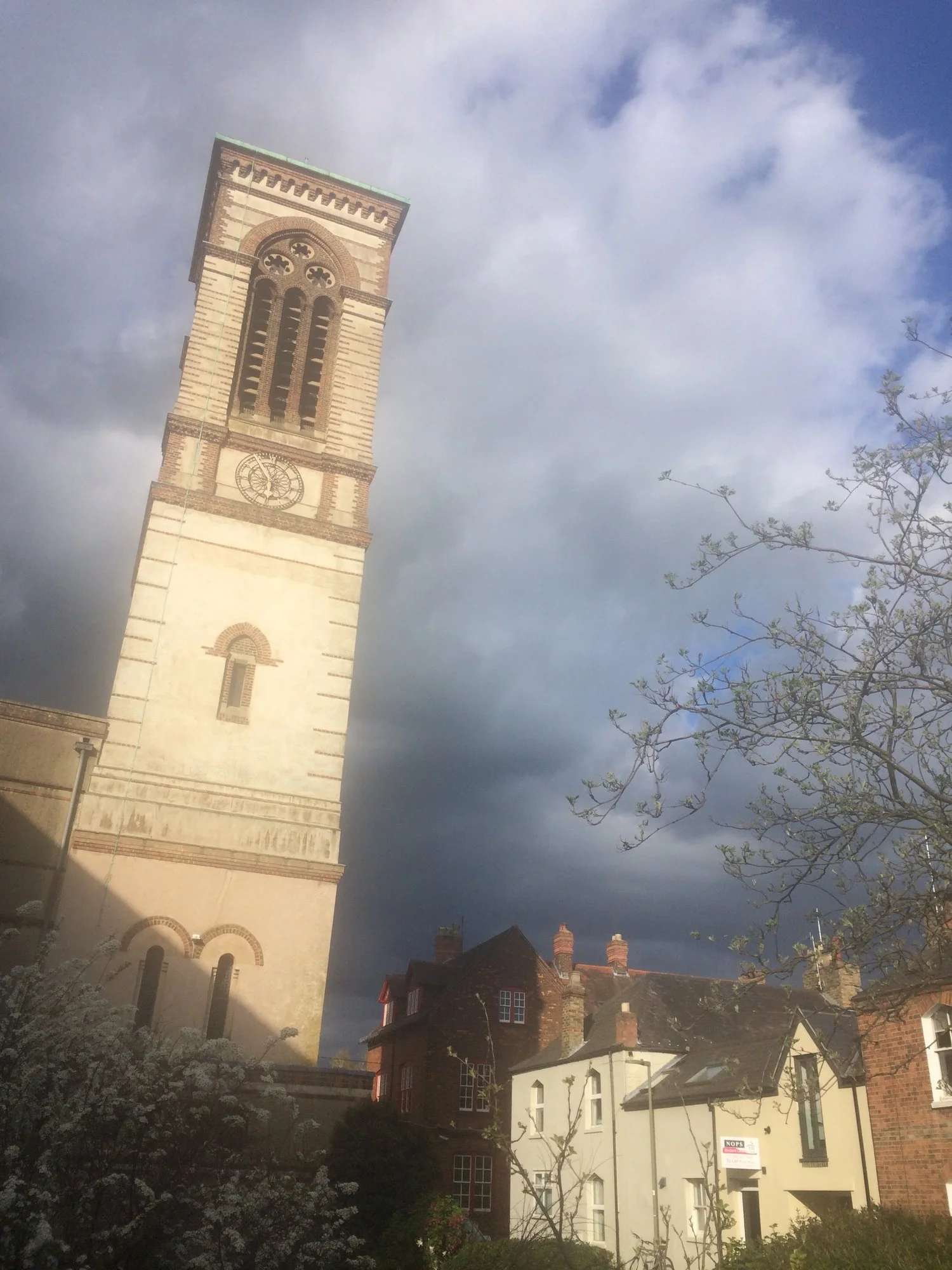I live to the cadence of church bells now. Elizabeth Goudge called Wells the ‘city of bells’ but it could easily describe Oxford; you can hear a chorus of them striking at the oddest times. Sometimes a single, dramatic toll to mark the hour, sometimes great, waterfall crescendos of them ringing through the streets. Now, though, with my front room window facing the golden brick of a church tower and the bells humming out on the quarter hours from 6:45 to 11 at night, the bells are personal to me, deep old voices warbling a call to prayer, singing my every day into a kind of structured music.
In a way, those bells and the cadence in which they frame my hours are part of the larger rhythm I’ve learned during my time in Oxford as I’ve increasingly (if erratically) adopted the practice of morning and evening prayer and the marking of the year by the seasons of earth and church. There is a clear sense in British culture and in my church here of both time and space as things you mark and claim, realities made sacred by the way you see them, the words with which you frame them, the actions with which you fill them.
I encountered evening prayer my first month in Oxford, and as I began to attend regularly, hearing Scripture and prayer at a set time each day, I found the liturgies forming my thought, comforting me in stressed moments, giving me a cadence of worship in which to live the crazy rounds of my days. Then I found the glory of the church year, with its high days centered on the central events of Christ’s life; not just Christmas and Easter, birth and death, but Ascension and Pentecost, feasts that remind me of Christ’s return to the Father to prepare a place for all who love him, and of the Holy Spirit coming among us. What these prayers and feasts, these liturgies offered me was not only a mind formed by reverence, but a deepened sense of identity, a fuller knowledge of who Christ is and the hope and glory to which he is drawing me.
Two years and many church bells later, I’m deeply thankful for this rootedness because I find myself in dire need of anchors in the midst of a very uncertain world. Is it just me or is the world louder in its confusion and grief these days?
I feel that I have watched the clamor of the world roar to a pitch of late that can unsettle even the calmest soul. Whether by political complications, by questions of God’s presence or will, or simply by the sheer fact of the countless who are suffering and dying in war, even those who love God find life right now to be a disorienting thing. Faithfulness requires us to question: Who are we in the midst of this? What does it mean to do rightly? How do we live out the kingdom in such a fallen world?
In the midst of these questions, I’ve reconised afresh the power of tradition – of daily, yearly, regular celebrations - to root me in truth, refresh my sense of identity, and remind me of what is essential. I think the human psyche craves liturgy – we all crave cadence. We all need to daily wake to remember – who we are, what we hope for, what we can trust. As I’ve pondered this reality, reconising what a gift my church life in the past two years has been, I’ve also come to a freshened thanks for the traditions of home, the liturgies of family devotion and bedtime prayer, the feasts of family celebrations that shaped my identity and rooted me in a sense of love.
Before I ever discovered evening prayer at Oxford, I had learned the rhythm of prayer with my mom at bedtime as she tucked me in tight to bed, her goodnight prayers tucking me securely into a sense of God’s presence as well as that of my quilts. Daily prayers with my Dad at the breakfast table, each day something we gave to God, the words framing in all the coming hours with the consciousness of the God who gave them. Special prayers with my siblings, all of us together, holding hands when our family found times of great need or fear.
Girl's club: our last time of sharing life secrets and friendship together in Oxford before I got married. This is a life-long tradition with us girls. It has held us through many hard times.
Before I came to any church feast, I knew the feasts and special days of my family. Our ‘shepherd’s meal’ every Christmas eve, with all the lights off except the candles, bowls of potato soup and bread before us, the Christmas story read aloud from Luke. ‘Family Day’, every summer, when we gathered for cinnamon rolls and then spent a morning listing out all the ways we’d watched God be faithful to us in the past year. Birthday breakfasts of quiche and cinnamon rolls (we do like cinnamon rolls) where each sibling and parent (however shy) had to say what they valued in the birthday child. Afternoon teatimes, and reading by the evening fire, family walks and devotions, from the time I was tiny I lived in the cadence of our family traditions.
What those formed in me was a sense of myself as a lover of God and beloved member of the little fellowship of family my family, as driven by ideals of courage and virtue as the famous fellowship in Middle Earth. Our traditions became the lens through which I understood life: as a wondrous gift, as a story to be lived well, as my chance to bring God’s kingdom into being. That gift of self-understanding is something that gives me courage and roots me even in the present, something continued by the rhythms of worship I’ve now learned in the larger world of the church.
In a world of profound moral confusion and change, the cadences by which we live, the rhythms we choose, the stories we embody, may be the difference between hope and despair. It’s not that a birthday breakfast or half an hour of prayer at a certain time makes everything right in a broken world, or a candle lit makes a space suddenly sacred. Rather, those acts of order and grace allow us to live in awareness of a reality larger than what we can see. We remind ourselves of Eternity by anchoring a couple of our fleeting hours each day in the prayers that allow us to stand in God’s unchanging presence. We remind ourselves of Christ’s redemptive love by giving a little of it to those around us in concrete, daily, visible ways. We teach ourselves to hope for the new heaven and earth by beginning to make a little of it visible in the beauty bring to home, the hospitality we share, the love we weave into each corner of our lives.
At play here, once again, is the incarnational principle that we make visible, daily, what we believe to be true. We live by ‘faith in what we cannot see’, in life beyond death, in beauty beyond pain, in love beyond hatred. The rhythms of word and action, the cadence of prayer and remembrance, that we institute in our homes will remind us of who we are and what we want to be when we are confused, exhausted, and alone. Our traditions form our stories. And home is where they begin.
Breathe In: Rhythms of Prayer
What words frame your day? What are the rhythms of quiet, reflection, and prayer that anchor your experience of the world? I inherited my parents daily habit of Scripture reading and prayer so that even if I can only manage a Psalm or a couple of Gospel verses, I try to open the day with the Bible. But I have loved adding liturgy to my devotion, joining in morning prayer at church, or simply praying some of the daily prayers of the Church on my own. There is a rich, sustaining grace that comes from praying words that have been said through centuries of human heartbreak and hope, sustaining believers in time of war and hardship as well as in times of plenty.
If you don’t know where to begin, you can always use a Book of Common Prayer. I’ve also used Celtic Daily Prayer by the Northumbria Community (my Mom and Joy love this too). You could also use something like George MacDonald’s Diary of an Old Soul – his collection of devotional poems written to last one a day for a year.
Whether Scripture, liturgy, or poetry, consider what words frame your experience of the day. What do you wake to? What reminds you of who you are? What gives you hope? What words do you want to form your own sense of identity, and that of your children?
Daily tea time, and Sunday high(er) tea are regular celebrations with us.
Breath Out: Cadence of Celebration
I think we celebrate what we love, and what we hope. Think about it, Christmas, Easter, birthdays, the 4th of July, all of these holidays (holy days!) are celebrations centered on what we value – the fact that Christ was born, that death will be overcome (something we still hope to see), freedom (and our hope for it to continue). We need to mark these things in order to remember, to reaffirm our hope in all the ‘bad things coming untrue’.
But what about on the level of the ordinary?
What do we mark every day by making it special? One of the greatest gifts I received from my mom was a penchant for marking the beauty of the ordinary. Whether it was a teatime on our favorite china, or a walk in which we marked the changing colors of the season, or lit candles on the dinner table every night (and a well-set table when we could manage), I was taught to encounter the ordinary as a gift, to recognize God’s generosity in the every day. In an impersonal, hurry-up culture of our time, this way of celebration has allowed me to live in what I think is a greater awareness of God’s presence, to remember that He is always ‘at play’ all around us, the beauty of creation constantly speaking hope into our despair.
Girl's club tea times - my sister and mom and I snatched special moments together whenever we could. Sunday afternoon tea with a book read aloud. Saturday morning walks and coffee together. Those small celebrations linked us to the larger ones of the church, marking the epic story of Christ’s redemption, on the level of the cosmos... and our dining room. What small feasts will you throw?
Reading: The Book of Iona: An Anthology. Joy's gift when she came for a visit from Scotland, as well as 'research' for the paper I'll be writing on Celtic monastic life. I really hope I get to visit Iona as part of the research process...!
Listening: Jon Foreman. Another great recommendation of my sister. Limbs and Branches.
Eating: 5-Ingredient Brownies. This is an almost painfully simple recipe, but it was approved by our houseful of teenage boys. (Can you tell I’m baking a lot of desserts at the moment? Or puddings, as they call them here in England. I think it’s the autumn damp that makes me want warm, baked things….)





